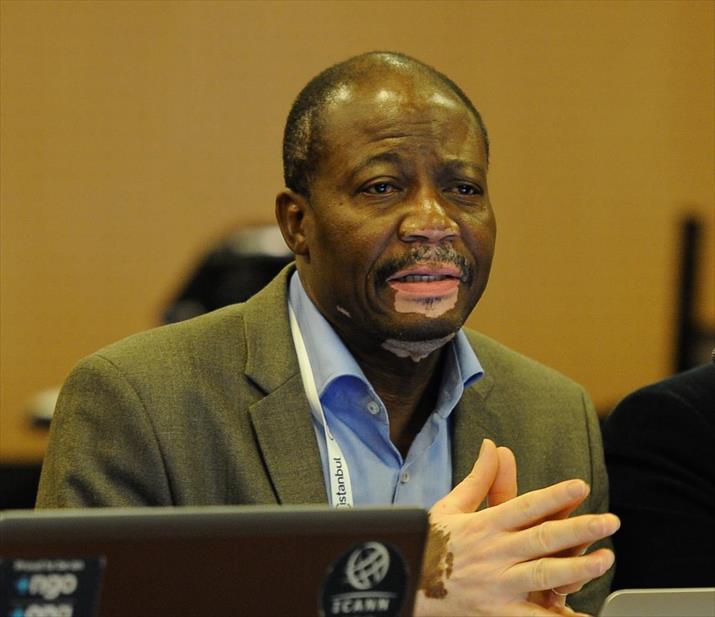|
||||||||||
| Home Nation World Business Opinion Lifestyle ChinAfrica Multimedia Columnists Documents Special Reports |
|
||||||||||
| Home Nation World Business Opinion Lifestyle ChinAfrica Multimedia Columnists Documents Special Reports |
| Africa |
| Getting Africa Online |
| The rapid development of the Internet brings opportunities not only to China, but also to African countries. |
| CHINAFRICA | VOL.9 October 2017 ·2017-09-28 |

African youth benefit most from being connected
Experts believe that Africa has the considerable potential to develop Internet-related businesses, including the domain name industry. However, this potential is being negated by barriers such as the lack of communication facilities and infrastructure, low literacy rates and an absence of financing schemes, according to Pierre Dandjinou, Vice President of Stakeholder Engagement in Africa of Internet Corp. for Assigned Names and Numbers (ICANN).
ChinAfrica contributor Kamailoudini Tagba spoke with him on the Internet while he was attending the Fifth Africa Domain Name System (DNS) Forum held in Dar es Salaam, Tanzania, in late July. The mission of ICANN, formed in 1998 as a global non-profit public-benefit corporation, is to help ensure a stable, secure and unified global Internet system. Dandjinou shared his views on the need for collaborative efforts to overcome the Internet barriers in Africa and how entrepreneurship will benefit from this effort. Edited excerpts of his views follow:
ChinAfrica: What is ICANN's approach to Africa and what outreach efforts have been made to date?
Pierre Dandjinou: Internet is growing, and policy development with regards to the Internet is becoming crucial. It is important for African countries to look out for the right policies, investments and focus related to developing the Internet ecosystem in their countries and the region as a whole. That is a major reason ICANN focuses on outreach efforts in the region, so that Africa's voice is better heard in the digital sphere. As part of the global ICANN community, there are opportunities for stakeholders in Africa to shape ICANN's policies to help serve their communities' interests and needs. A new mechanism we have developed at ICANN is the empowered community. This is based upon strengthening this kind of participation through giving more power to the community in ICANN's bottom-up structure.
Another effort we are working on is raising awareness for an internationalized domain names program in Africa. This program aims to enable people globally to use domain names in their local languages and scripts. This is something the community in Africa should leverage to support our linguistic diversity for the Internet's top-level domain names, which, in turn, will help populate our content on the Internet in our languages.

Do you think there is a link between entrepreneurship and the Internet?
Africa is rising in the digital sphere, yet the connectivity across the continent is not evenly distributed. More than 800 million Africans out of an estimated 1.2 billion do not have Internet access. Many live in rural areas, without access to infrastructure, or they simply cannot afford to access the Internet where it is available. On the other hand, in five of the continent's largest countries - Nigeria, Egypt, Kenya, South Africa and Morocco - Internet penetration is now close to the global average.
Through this lens, Internet infrastructure is key to entrepreneurship. How will a young entrepreneur market his idea or product if he can't open up via the Internent to the global market? Without an efficient Internet, businesses find it very hard to grow, and entrepreneurship depends on this growth. But again, infrastructure is an area to be dealt with by local people and governments.
In fact, much is being done on the infrastructure front with many submarine cables surrounding the continent, countries beefing up their gateways and mobile and network operators moving from the 3G to 4G LTE technologies.
How can the Internet boost youth participation in the economic growth of their countries?
In Africa, the richest 60 percent are three times more likely to be connected than the bottom 40 percent, with women are only half as likely to have Internet access as men. Lack of basic literacy or digital literacy is a big drag on usage.
It is imperative for African countries to identify which problems affect them most severely and develop relevant solutions. A multi-stakeholder approach involving governments, the private sector, civil society and NGOs can be very effective in building consensus on the most beneficial policies and actions to adopt.
Creativity and innovation in the digital world are crucial for its growth. Over the past couple of years, we witnessed an unprecedented expansion of the domain name space, with over 1,000 top-level domain names added to the Internet. To be precise, by the end of July, we had 1,227 new generic top-level domains delegated.
The domain name industry in the digital age has become very important. We, in Africa, need to help create awareness of this, through engaging with the various players in government, civil society, academia, technical experts and NGOs to provide expert assistance where necessary in order to build capacities in the relevant areas. One of the important trends we are seeing is the rise of innovation hubs across Africa, namely in South Africa, Nigeria, Kenya and Mauritius. These hubs promote youth entrepreneurships by providing startups with a space to develop their applications. These applications are then marketed as accomplishments of young African developers in the region, requiring appropriate business plans and financing mechanisms. We need to encourage and support these youth for new businesses and startups to flourish and thrive.
What does Africa need to do in relation to the Internet going forward?
We need to take note of the recommendations that came out of the Africa DNS Market Study. For instance, one of the recommendations was that a DNS observatory must be established to track changes in the use of the DNS in Africa. There is considerable potential in Africa for the development of Internet-related businesses, including the domain name industry. Yet there are barriers such as lack of communications, lack of infrastructure, low literacy and financing schemes to realizing this potential. We need collaborative effort to overcome these barriers.
It is important that we work together to foster dialogue between the right parties from around the world. The Internet is global, yet local at the same time. That's why it's so important for Africa to participate in ICANN, so our countries, our language and our cultures are represented.
We must continue raising awareness and demonstrating how the African domain name business and industry can develop, so that young Africans learn from us, and get help on the resources they need to move ahead.
How did you see the recent Fifth Africa DNS Forum in Tanzania?
The Africa DNS Forum is an important event. It gives us the opportunity to inform the continent's different communities about the domain name industry and engage with them on how best to strengthen Africa's digital presence.
The African community has done a great job and put a lot of effort into making this forum an annual pilgrimage for the regional DNS community. I strongly believe that together, we have laid down a solid foundation for the DNS industry in Africa. However, a lot still remains to be done, especially at the local levels.
It is the Africans who will drive the development and expansion of Internet in Africa, just like they did kicking off this growth. Working together is crucial. We help provide the grounds for Africa's realization of its digital potential, yet it depends on African participation to make it come true.
Indeed, the domain name industry can only thrive if certain other conditions are met, namely Internet accessibility and affordability, and content and applications that are indigenous and aim to solve local issues. So the domain name industry is only one part of the local Internet ecosystem.
| About Us | Contact Us | Advertise with Us | Subscribe |
| Copyright Beijing Review All rights reserved 京ICP备08005356号-5 京公网安备110102005860号 |